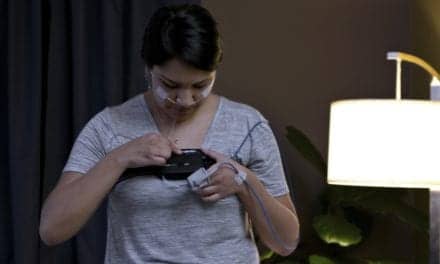Researchers in the United Kingdom are trialing a new diagnostic device, AcuPebble, which they believe could help those who experience obstructive sleep apnea (OSA) get a quicker diagnosis.
This small device is placed on the neck of the patient overnight and records sleep data (including heart rate, breathing rate, and oxygen levels). In the morning, this data is automatically analyzed, and the diagnostic report is sent to the patient’s doctor.
Currently, a patient with symptoms that indicate OSA needs a general practice referral to a specialist hospital before collecting and being instructed on how to use overnight sleep study equipment. They must return it the next day and wait for data analysis and a hospital follow-up appointment, according to the researchers.
The AcuPebble device, originally developed by Imperial College London and manufactured by Acurable, represents an alternative approach. The device can be mailed directly to patients for home use, with simple instructions to follow for an overnight sleep test, according to the researchers. The patients then can then return it by mail, and the results are immediately analyzed and will be ready for the referring clinician or secondary care consultant to review them the next day.
Patients who may be at higher risk of OSA (for example those who are overweight, have hypertension, diabetes, or both) will be invited to take part in the study.
Investigators aim to recruit 1,426 participants from general practices working with the West Midland Clinical Research Network and will compare the number of new diagnoses of OSA in those using the AcuPebble and those having standard care through the traditional referral pathways.
The researchers will investigate how each approach compares in terms of effectiveness and value for money for the United Kingdom National Health Service. “If this strategy is successful in detecting OSA, it could potentially be rolled out in primary care to improve the diagnosis and treatment of OSA,” says chief investigator professor Michelle Miller, PhD, Warwick Medical School, University of Warwick, in a release.
Co-chief investigator professor Francesco Cappuccio, MD, University of Warwick, adds in a release, “Our study will provide the evidence needed to cut the waiting time from months to days and suggest a new diagnostic pathway to be adopted in the future. There would also be economic benefits. Highly valuable professional time of doctors and physiologists currently spent for diagnosing OSA could be diverted to a more effective management of OSA in many more patients.”
The Finding Obstructive Sleep Apnea Using a Novel Device (FOUND) trial is a collaborative project between the University of Warwick, the University of Oxford Primary Care Clinical Trials Unit, University Hospitals Coventry and Warwickshire, the University of Birmingham, and patients’ representatives from local outpatients sleep clinic and from two national charities, Hope2Sleep and the Sleep Apnoea Trust.





